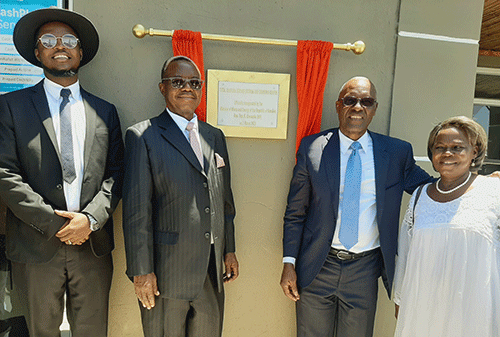ONGWEDIVA – The Minister of Mines and Energy Tom Alweendo said the ministry has been issuing too many new licences to trade in fuel, while consumption has not increased.
He stressed this will mean retail outlets are pumping less volume, which will have a negative impact on their businesses.
He stated that the ministry is no longer issuing licences to new fuel retailers.
Alweendo said new licences will only be issued in areas where no fuel retail outlets.
He said this during the official opening of TotalEnergies service station at Okatana in Oshakati on Friday.
Alweendo said since 2018, the ministry issued 87 new retail licences, bringing the total of active licences to more than 500 countrywide.
During the same time, Alweendo said annual total fuel consumption for petrol was 429 million litres and diesel was 727 million litres.
Last year, the total fuel consumption for petrol was 338 million litres, while diesel was 755 million litres.
From these numbers, the average volume per month per retail outlet is 56 000 litres of petrol and 121 000 litres of diesel, Alweendo said.
“These figures tell us that we have been issuing too many new licences to trade in fuel, while the consumption has not increased,” he said.
He added that this means the same amount of fuel is now being shared among many more retail outlets.
In addition, Alweendo also emphasised that the ministry is concerned with fuel prices that have been increasing for some time now.
“This is a phenomenon that has been with us for almost over three years. In 2019, the average petrol price per litre was N$13. In 2022, the average price was N$20. This is an increase of 54%. As a government, this is of great concern to us because it is putting a heavy burden on the consumer and has a detrimental effect on industries such as agriculture that use huge quantities of diesel,” he further stressed.
According to Alweendo, the main reason for the increase in the fuel price is the fluctuation in the international price of crude oil. For example, the average price of a barrel of crude oil in 2015 was US$52 and in 2022 it was US$100.
“This is an increase of almost 100%. Recently, the situation has been made worse by the war between Russia and Ukraine. If this continues, we are likely to see further fuel price increases,” Alweendo stressed.
Also speaking at the event, the service station owner who is also the executive chairman of Namshingo investment, Paulinus Shilamba said his business has brought about a number of socio-economic benefits to the national and local economy.
“These include bringing essential services closer to the local communities, additional revenue to the State through taxes and employment opportunities to the members of the local community,” he said.
Shilamba added that when they started in 2016, he had only nine employees.
“Today our business has a total staff complement of 53 workers, of which 31 are directly employed by our company and 22 by the leased containers business units which are being rented.”
-fhamalwa@nepc.com.na


